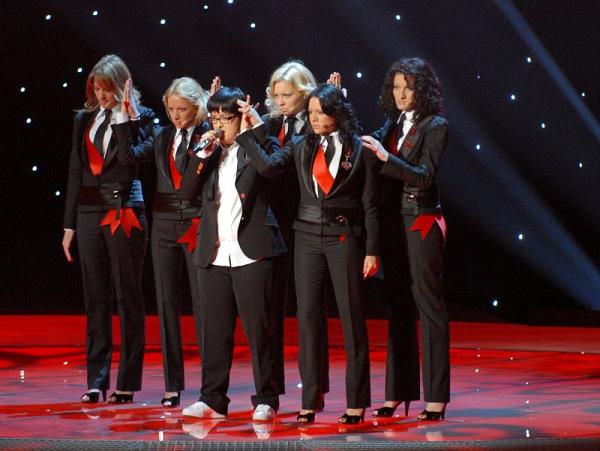Slavic triumph of Eurovision 2007
Eurovision 2007 ended with a resounding victory for the Slavic triad – Serbia, Ukraine and Russia got three first places.
Moreover, the competition was extremely acute and the final result was not at all easily predictable. Eurovision itself has become predictable – Eastern European countries bite into the few European tops that are available to them. But why?

Results of the Eurovision-2007 contest
- Serbia – 268 points;
- Ukraine – 235 points;
- Russia – 207 points;
- Turkey – 163 points;
- Bulgaria – 157 points;
- Belarus – 145 points;
- Greece – 139 points;
- Armenia – 138 points;
- Hungary – 128 points;
- Moldova – 109 points;
- Bosnia and Herzegovina – 106 points;
- Georgia – 97 points;
- Romania – 84 points;
- Macedonia – 73 points;
- Slovenia – 66 points;
- Latvia – 54 points;
- Finland – 53 points;
- Sweden – 51 points;
- Germany – 49 points;
- Spain – 43 points;
- Lithuania – 28 points;
- France – 19 points;
- Great Britain – 19 points;
- Ireland – 5 points.
Arena of Restrained Ambition
Yuri Aksyuta at the pre-competition press conference proudly stated that it was Channel One that was able to promote the contest within Russia to such an extent that the broadcast rating of the small-town contest for housewives became commensurate with the most popular programs of all domestic channels combined. The paradox is that such a phenomenon is observed not only in Russia. In almost all Eastern European countries, television contest broadcast ratings have risen to heaven. But in the old countries of Europe there is no such trend.
For several consecutive years, countries from the former Eastern Bloc have been fighting frantically for victory – they are preparing a witty show, hiring expensive stylists, sending their best artists and nervously jealously following the results of the neighbors’ votes. What used to be typical of such kids as Malta or Andorra is now a scourge of giants on European scales – Ukraine, Belarus or Poland. Not to mention Russia. Functionaries of the European Broadcasting Union note that the number of accredited journalists and music tourists from these countries has grown tenfold.
Eurovision has quietly become an arena of restrained ambitions. The new EU countries are eager to prove that they are already completely Europeans. The rest is no worse than the Europeans. Actually, what kind of motivation does Old Europe have? Yes, no.
Orientation – to freaks
The current winner – Serbian singer Marija Šerifovic – performed the simple ballad “Prayer”, but she did it powerfully and brightly
At the Eurovision Song Contest, upscale artists have never won. Exceptions like ABBA and Celine Dion only confirm the rule. The last winners – the mediocre pop singer Ruslana and the mediocre rock band Lordi – are still at the hearing. And the current winner, Serbian singer Marija Šerifovic, also did not show off her vocal skills or a phenomenally hit song.
She sang the simple ballad “Prayer,” but she did it powerfully and brightly. The eye-catching aggressive image of Butch (active lesbian) and compassionate intonations conquered the television audience. And even the coquettishly laughing blondes from the dance-house on the words “Prayer on my lips burns like heat” did not embarrass her falsehood. Will this song appear in all European charts and radio broadcasts tomorrow? Of course not.
Artists from recognized musical countries – England, France, Sweden – have no reason to rush to the Eurovision Song Contest. If only because he is outside the main world musical trends that are of such interest to these artists. Most of the musical material comes from 80s ballast. Retro-monsters walk around the stage and entertain with eye goggles of the viewer. There are no actual songs, and even if they appear, then victory does not shine for them. Say, the current R’n’B was sounded only in the song by the Poles, and they didn’t even get out of the semifinals. The most famous and box office in Europe from the contestants are DJ BoBo (Switzerland) and The Arc (Sweden). The first did not go through the semifinals, the second took 18th place.
The fundamental freak bias of Eurovision is especially striking when comparatively listening to the tracks of the contestants and the tracks from the main Billboard 200 world chart. The difference is incredible.
The only one who put on the quality of musical material was Russia this year. The track of Max Fadeev, who emerged from the lull, although secondary to Black Eyed Peas or even Michael Jackson, is tightly arranged, laced with fashionable sound chips and singed for a while. The reason this commercial product appeared in Helsinki is impossibly simple. Fadeev needs PR of a new project in post-Soviet countries, and he received it for free. The fate of the concert activities of “Silver” in the coming years looks cloudlessly happy.
Perhaps such a cynical approach is much more reasonable than the emotional tantrums of our Ukrainian neighbors. Even if Silver did not take the third, but the 18th place, the job would be done. But Verka Serduchka has nowhere to retreat. Behind her is the boiling anger and belching curses of the respectable singing Ukraine. A place outside the first three would mean that they are right. That the voiceless freak with the fifth size of the foam rubber breast “disgraced” Ukraine.
And Andrei Danilko tried his best. Such a hilarious acting show can not be recalled in recent years. Instead of pyrotechnics – an impressive bust. Instead of pop vocals – chants and snatches. Pathos waving hands, and right there – dumping of pathos into clumsy dance movements. Serdyuchka hung from sequins from head to toe, ran after the cameras, clapped her back-vocalists in impressive sizes, and made an explicit sexual gesture on the code. And it worked! Weighed down by political correctness and gender identity, Europe dropped the burden of responsibility for three minutes and laughed heartily. From the heart – the Slavs are able to recall this.
In fact, it was Verka Serdyuchka who won the main victory in this competition.
Politics is gone and will not return
If in Estonia one third of the population are Russians offended by the authorities, is it worth it to be surprised at 12 points for “Silver” from Estonia?
It should be noted that until recently “Eurovision” was considered as in a certain sense a political competition. Something like the “Time” program on Channel One (both in Soviet times and under the current president). Whom to encourage, whom to send to hard labor – we catch directions from the foggy European top. However, the appearance of a huge number of new states on the map of Europe reduced the political component to zero. The worldview of the Irish and, for example, the Albanians is terribly far from each other, and the weight of the votes is the same. Now the sympathies of viewers are determined by simple earthly addictions. The notorious vote for an artist of a neighboring country is caused not by a global political science scenario, but by the fact that a TV channel from a neighboring country is caught at home, and the artist himself comes to concerts every month. But only.
If three million Turks live in Germany, then the votes of any Turkish artist are guaranteed. If in Estonia one third of the population are Russians offended by the authorities, is it worth it to be surprised at 12 points for “Silver” from Estonia? These are normal human feelings. Finally, the winner of Eurovision-2007 was a Serbian singer, and the next contest will be held in Belgrade. Recently, almost completely destroyed by European and American bombs, but unconquered. What a policy.
The only loser was Dim Koldun, “imprisoned” for a gay audience. And also not because he is from a rogue country. In the semifinals, he still stood out for his image, but in the finals, something happened to him. And he sang much worse, and competitors with the same image increased. Sixth place, however, is also far from a failure. But you can’t call it an unconditional success (given the stakes of bookmakers for 1-3 places), as producer Philip Kirkorov and the journalists close to him tried to present to the audience with laughter, after the end of the contest.
Eurovision 2007 is over. In the first six – five Slavic artists. It is necessary to completely drown in the intricacies of show business, so as not to rejoice at this simple clear fact. Let’s rejoice.
And the Eurovision ship will sail further. We only know the next pier – Belgrade-2008. And we must ever win this most unnecessary song contest in Europe!
This post is also available in:
 English
English  Русский (Russian)
Русский (Russian)





